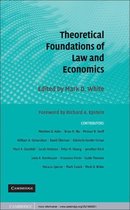Law, Economics, and Game Theory Ebook Tooltip Ebooks kunnen worden gelezen op uw computer en op daarvoor geschikte e-readers.
Afbeeldingen
Sla de afbeeldingen overArtikel vergelijken
Samenvatting
This book considers three relationships: law and economics; economics and game theory; and game theory and law. Economists teach lawyers that economic principles cut across and integrate seemingly different legal subjects such as contracts, torts, and property. Correspondingly, lawyers teach economists that legal rationality is a separate and distinct decision-making process that can be formalized by behavioral rules that are parallel to and comparable with the behavioral rules of economic rationality, that efficiency often must be constrained by legal goals such as equal protection of the laws, due process, and horizontal and distributional equity, and that the general case methodology of economics vs. the hard case methodology of law for determining the truth or falsity of economic theories and theorems sometimes conflict.
Economics and Game Theory: Law and economics books focus on economic analysis of judges’ decisions in common law cases and have been mostly limited to contracts, torts, property, criminal law, and suit and settlement. There is usually no discussion of the many areas of law that require cooperative action such as is needed to provide economic infrastructure, control public “bad” type externalities, and make legislation. Game theory provides the bridge between competitive markets and the missing discussion of cooperative action in law and economics. How? Competitive markets are examples (subset) of the Prisoners’ Dilemma, which explains the conflict between individual self-interested behavior and cooperation both in economic markets and in legislative bodies and demonstrates the need for social infrastructure and regulation of pollution and global warming.
Game Theory and Law: Lawsuits usually involve litigation between two parties, not the myriad participants in markets, so the assumption of self-interest constrained by markets does not carry over to legal disputes involving one-on-one bargaining in which the law gives one party superior bargaining power. Game theory models predict the effect of different legal institutions, rights, and rules on the outcome of such bargaining. Game theory also has a natural four-model framework which is used in this book to analyze the law and economics of civil obligation, which consists of torts (negligence), contracts, and unjust enrichment.
Productspecificaties
Inhoud
- Taal
- en
- Bindwijze
- E-book
- Oorspronkelijke releasedatum
- 06 juli 2020
- Ebook Formaat
- Adobe ePub
- Illustraties
- Nee
Betrokkenen
- Hoofdauteur
- John Cirace
- Hoofduitgeverij
- Lexington Books
Lees mogelijkheden
- Lees dit ebook op
- Desktop (Mac en Windows) | Kobo e-reader | Android (smartphone en tablet) | iOS (smartphone en tablet) | Windows (smartphone en tablet)
Overige kenmerken
- Studieboek
- Ja
EAN
- EAN
- 9781498549097
Je vindt dit artikel in
- Categorieën
- Taal
- Engels
- Boek, ebook of luisterboek?
- Ebook
- Studieboek of algemeen
- Algemene boeken
- Beschikbaarheid
- Leverbaar
Kies gewenste uitvoering
Prijsinformatie en bestellen
De prijs van dit product is 44 euro en 99 cent.- E-book is direct beschikbaar na aankoop
- E-books lezen is voordelig
- Dag en nacht klantenservice
- Veilig betalen
Rapporteer dit artikel
Je wilt melding doen van illegale inhoud over dit artikel:
- Ik wil melding doen als klant
- Ik wil melding doen als autoriteit of trusted flagger
- Ik wil melding doen als partner
- Ik wil melding doen als merkhouder
Geen klant, autoriteit, trusted flagger, merkhouder of partner? Gebruik dan onderstaande link om melding te doen.








